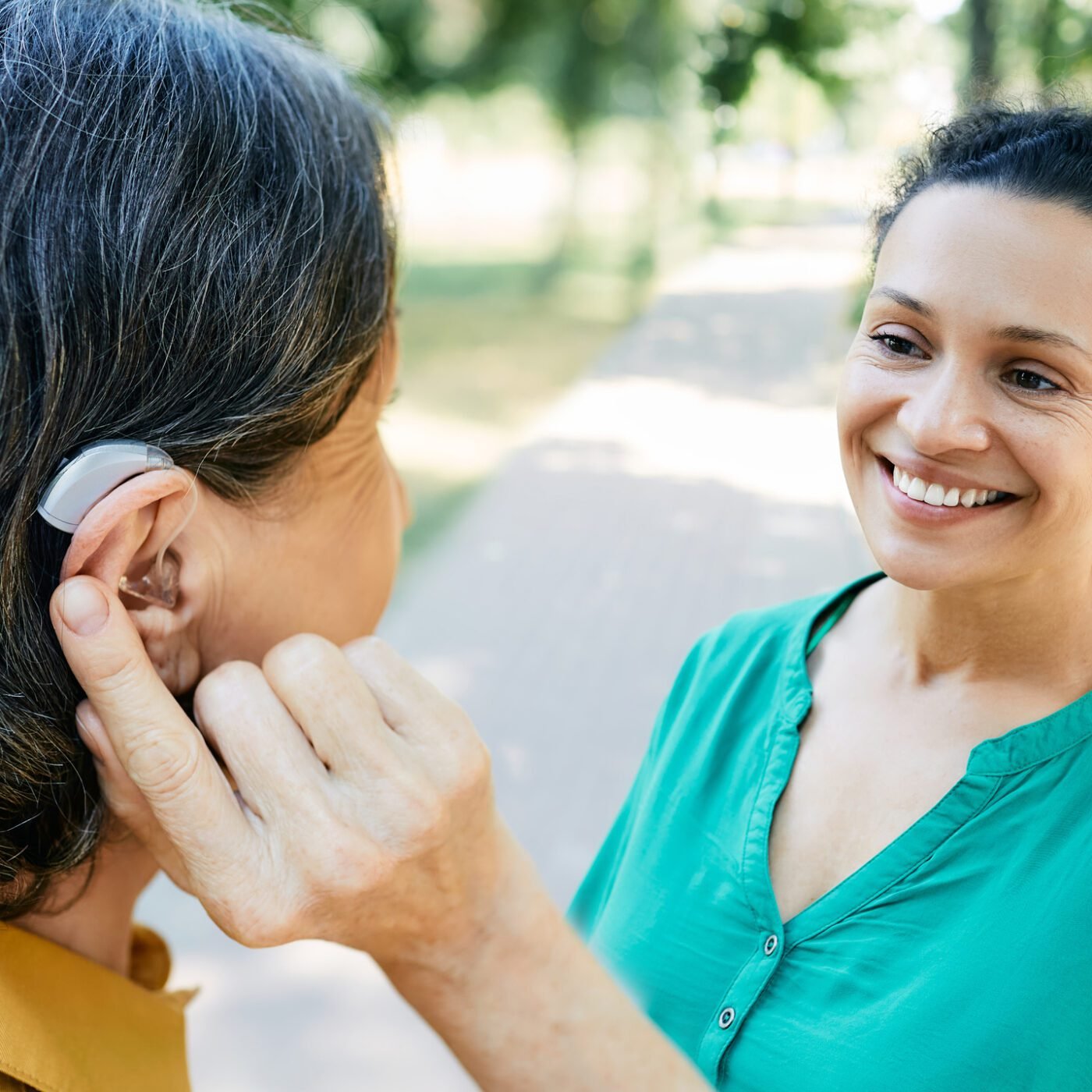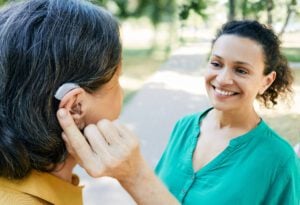Caring for different types of hearing loss
Tags
Complex Care
According to Age UK, hearing loss affects around 12 million adults in the UK. People with hearing loss may not always require specialist care in later life, especially if they’ve lived with it for a while and have learned ways to adapt. However, if someone has age-related hearing loss (presbycusis), or a complex condition such as dementia, understanding the impact hearing loss can have on their quality of life is crucial to ensuring they get the specialist support they need.
What is hearing loss in the elderly most commonly associated with?
According to RNID around 71% of people over the age of 70 have some form of hearing loss. The most common type is presbycusis – also known as age-related hearing loss. It usually occurs gradually and is caused by wear and tear to the hair cells in the ear.
Noise-induced hearing loss is a type of sensorineural hearing loss that occurs when the inner ear is damaged through exposure to loud noises. It’s common among people who spent their lives working in loud environments before ear protection became the norm – such as in construction or factory jobs. This form of hearing loss may get better over time, however, in some cases, the damage to the auditory nerves is too severe and leads to permanent hearing loss.
What are the signs of hearing loss?
It’s not always easy to tell if your hearing is getting worse. Often it’ll be those around you who pick up on the signs. These can include –
- You need the TV volume to be louder, or you find yourself constantly using subtitles.
- You struggle to hear people correctly on the phone
- You can’t always hear people talking, especially in a crowded place, or somewhere with a lot of background noise
- You find it hard to follow conversations and often need to ask people to repeat themselves
- You regularly feel tired or stressed because of how hard you need to concentrate when trying to listen to things
If you’re experiencing any of the above, or you feel your hearing is beginning to affect your everyday life, it’s important to discuss this with your GP. If they cannot treat it themselves, they might refer you to a hearing specialist for further support.
If you’re unsure whether your hearing is impaired, RNID has created a free online hearing test. It takes around three minutes to complete and measures how well you can hear speech against different levels of background noise.
Earwax buildup
Too much earwax can cause muffled hearing or sudden hearing loss in one or both ears. Ear wax helps to keep ears clean and free of germs and usually falls out of our ears naturally. However, sometimes too much earwax can build up and eventually lead to mild to moderate hearing loss.
This type of hearing loss is often easily treatable with ear drops, or in some cases professional ear irrigation or micro-suction to remove the wax. If you’re particularly susceptible to earwax buildup, the NHS recommend using low-strength olive oil drops regularly as part of your hearing care routine, to soften wax and help it fall out naturally.
Annual hearing checks
A good way to monitor your overall hearing health is to attend regular hearing tests. You can do this for free through the NHS. However, you may be referred to a hearing specialist by your GP which means you may be waiting a few weeks before you are seen.
An alternative is to have your hearing tested at an opticians or pharmacy. The test is usually still performed for free, but you’ll likely need to pay for any following treatment. Many audiologists recommend having annual hearing tests once you’re over the age of 50.
What happens during a hearing test?
There are a few different tests a specialist may do when assessing whether you have normal hearing or not. They may play you sounds or speech at different pitches, and ask you to press a button each time you hear them. Another test involves listening to sounds whilst wearing a special headband to see how well you can hear through vibrations.
They may also look inside your ear to identify ear canal blockages or a damaged or ruptured eardrum that could cause hearing impairment.

Caring for hearing loss
Experiencing hearing loss for the first time in later life can be a really lonely experience. Without the right support, a person may –
- Withdraw from or avoid joining conversations
- Avoid asking for questions
- Become angry or frustrated with those around them
- Feel less confident in social settings or loud or busy places
If you or a loved one has been diagnosed with age-related hearing loss, there are a number of things you can do to make day-to-day life easier.
- Sit down together and ensure everyone understands which kind of situations make it more difficult to hear
- Ensure you’re face to face when talking to each other so that you can clearly see the other person’s lips and facial expressions
- Reduce background noise by turning down the TV or radio, or moving to a quieter place to have a conversation
- Be aware of surrounding noises when out and about. For example, if you go to eat at a cafe, choose a table away from the kitchen – a booth can help soften noises around you too.
If you or a loved one is a hearing aid user make sure these are looked after properly. This includes –
- Change the tubing of your standard fit hearing aid every three to six months
- Change the filters over the receiver or microphone when they begin to look discoloured
- If using an open hearing aid, check the tubing and dome for wax and condensation regularly
- Regularly check and clean the ear mould of ear wax
- Ensuring you have a good supply of hearing aid batteries
There are other hearing devices that can help amplify sounds, provide alerts, and aid communication with others. You can find out more here.
Hearing loss and dementia
Experts believe that those with hearing loss are at greater risk of dementia. Those with mild hearing loss could be twice as likely, while those with severe hearing loss could be almost five times more likely to develop dementia. It’s not fully understood why there’s a link between hearing loss and dementia.
Many people already experiencing dementia symptoms will also be living with some form of hearing loss – and experiencing both at the same time can be really difficult. It can lead to social isolation, a depressed mood, and problems with everyday activities. It may mean their dementia appears to be worse than it is.
The following can help people with dementia manage their hearing loss –
- attending regular hearing checks
- Creating a dementia-friendly environment that’s well-lit and free from distractions
- Using gestures
- Using visual clues and prompts
Managing hearing loss in care homes
It’s estimated that 75% of people in care homes have hearing loss and that this will increase to 80% in the next decade.
Age-related hearing loss may go unnoticed in a care home as the signs may be confused for something else. For example, if someone is unresponsive, or looks confused when asked a question it may be put down to forgetfulness, dementia, or a mental health problem rather than a loss of hearing.
Unfortunately, untreated hearing loss can have a significant effect on a person’s well-being as it reduces their ability and access to communication. It may also have longer-term implications if they need a hearing aid, as the earlier they’re fitted the better they can work.
Action on Hearing Loss has been working with care homes to help managers and staff identify symptoms of hearing loss and better support residents. This includes clear guidance on how to best communicate with people with poor hearing, including –
- Asking if the person with hearing loss needs to lipread
- Ensuring they have their full attention before they start speaking, this could be done by gently tapping their arm
- Ensure the environment is well-lit
- Speak clearly, but not too slowly
- Use plain language and don’t go off on tangents
- Don’t raise your voice as this can be uncomfortable for someone with a hearing aid
- Writing it out instead may help may help. Use a thick pen if the person also has vision problems
Read more later life articles

Can I arrange nursing care at home?
Nursing care is provides care and treatment to people with complex medical conditions, but is it possible to receive it at home? We take a

Living well with diabetes in later life
It’s estimated that over a third of people with diabetes in the UK are over 65 years of age. That’s around 1.5 million people. Diabetes

Caring for different types of hearing loss
According to Age UK, hearing loss affects around 12 million adults in the UK. People with hearing loss may not always require specialist care in

Vision loss in older people – Is there a cure, and how can it be cared for?
Vision Loss Care: Is There a Cure? Your loved one may develop signs of vision loss as they grow older. However, there are ways to

Motor neurone care: How do I care for a loved one with motor neurone disease?
Motor Neurone care: How do I care for a loved one with Motor Neurone Disease? A diagnosis of Motor Neurone Disease, commonly referred to as

Arthritis in the elderly – causes and care options
Arthritis Care: What Causes Arthritis in the Elderly? Arthritis, which causes painful and inflamed joints, can affect anyone at any age. However, we tend